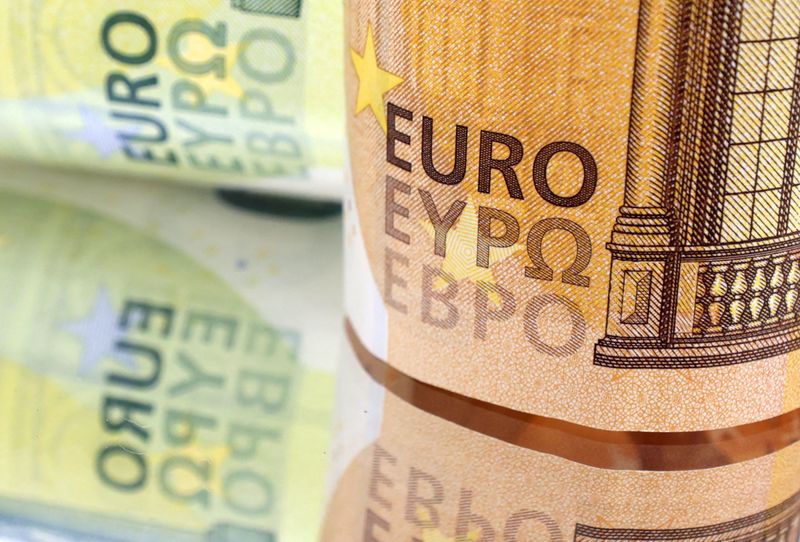By Francesco Canepa and Leigh Thomas
FRANKFURT/PARIS (Reuters) - "Because it's France" was how Jean-Claude Juncker, European Commission president at the time, explained Brussels' decision in 2016 to give leeway to the large, founder member of the European Union on the bloc's budget rules.
That patience continued even as the EU endured a sovereign debt crisis that almost sunk the euro and forced smaller, more indebted nations such as Greece and Portugal to adopt swingeing austerity measures.
But any indulgence for French exceptionalism may come to an end if France's snap election produces a eurosceptic, far-right government in Paris that could strain ties with other European capitals and test the very foundations of the euro project.
Marine Le Pen's National Rally (RN) insists it would not blow up the French budget. But questions persist about how it would fund costly spending plans within the eurozone's newly minted budget rules and whether the European Central Bank could step in to help if financial markets turn on France.
"If a country can just ignore the rules and be helped by the central bank, you'll get a lot of doubts about the future value of the euro and the future cohesion of the euro," said Holger Schmieding, an economist at Berenberg.
Such concerns are not on the official agenda of Thursday's EU summit. But with the RN leading polls in the two-round vote starting June 30, they are bound to occupy the minds of President Emmanuel Macron's fellow leaders.
Senior German government sources said they were dismayed by Macron's surprise decision to call elections that could usher in an RN-led government. One compared it to former UK premier David Cameron's ill-fated gamble on an "in-out" Brexit referendum.
In Italy, with an even bigger debt pile than France, a tinge of Schadenfreude over France's misfortunes is offset by fears that a French crisis could extend across the Alps, said Francesco Galietti of Rome-based political risk consultant Policy Sonar.
Otmar Issing, the ECB's first chief economist and one of the euro's architects, compared the debt of Italy and France to "a sword of Damocles hanging over the monetary union", bound to fall unless the problem is tackled.
"You can pull the hair by which it is attached but it cannot hold for ever," he said in an interview.
Even Greece is not cutting France any slack, with central bank governor Yannis Stournaras stressing that all member states needed to respect EU rules.
NO MORE INDULGENCE
Polling points to the RN emerging as the largest party, with or without a clear majority to pursue an awkward "cohabitation" with Macron until the 2027 presidential election.
France's fiscal credibility is already at stake with the International Monetary Fund questioning how it will reduce a budget deficit running at around 5.1% this year and its credit rating downgraded by two agencies.
In truth, France's fiscal sins far pre-date Macron. It has run budget deficits greater than the EU-mandated 3% for most of the 25 years since those rules came into force.
Brigitte Granville, economist at London's Queen Mary University and author of "What ails France?", said its rejection in the 1990s of German proposals for more complete political union reflected a desire to retain sovereignty over its finances.
She expected the RN, which long ago dropped calls to leave a single currency broadly accepted by French voters, to moderate its plans just enough to please Brussels if it came to power.
"They don't have a choice unless they want to leave the euro," Granville said in an interview.
RN statements to that effect have reassured investors, who were demanding a premium of just 70 basis points to own 10-year French bonds rather than their safer German counterparts - a far cry from peaks of 190 points for France and nearly 560 points for Italy during the 2011 debt crisis.
ECB chief economist Philip Lane told Reuters the moves in the French bond market did not appear "disorderly", meaning they don't meet one of the conditions for the central bank's intervention.
CAUTIONARY TALES
Observers point to cautionary tales ranging from Greece, where a leftwing government was brought to its knees by financial and political pressure, to Britain, where Prime Minister Liz Truss was forced to resign after unveiling a budget that unnerved investors.
Most analysts emphasise the ECB has the tools to stem contagion from a French crisis by buying bonds of other countries that do respect the EU's fiscal framework, meaning Paris might find itself isolated at times of need.
"There is, of course, a possibility that Frankfurt would intervene if the problems with France were to have some kind of external negative effects on other countries, like Italy," former ECB policymaker Ewald Nowotny said.
An EU official cited Rome as a model for Paris after Prime Minister Giorgia Meloni toned down her anti-EU rhetoric once elected in 2022.
This, along with her support for the EU's stance on conflicts in Ukraine and Gaza, has helped Italy keep the Commission and financial markets on-side despite repeatedly raising its deficit forecasts.
Jeromin Zettelmeyer, director of the Bruegel economics think tank in Brussels, said RN's rhetoric thus far did not suggest it was seeking a major confrontation with the Commission that could trigger a financial crisis.
However he said that if its officials ended up running key ministries, they could hamper EU moves to reform energy markets, advance the green transition and boost the bloc's competitiveness by reforming its capital markets.

"If the far-right gets elected that is bad news for EU integration because they would control the government positions involved in most dimensions of EU policy-making,' he said.
"The question is whether that is reversible or existential."